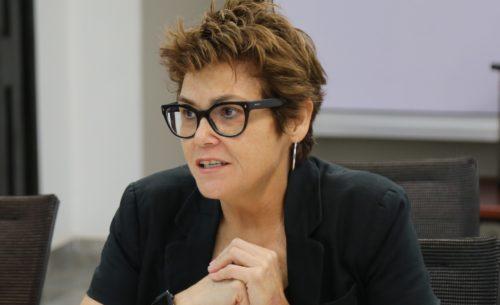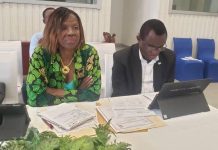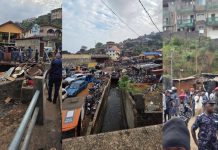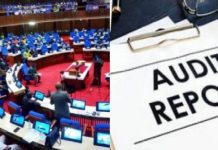Africa-Press – Sierra-Leone. At the launching of the National Disaster Management Agency in Sierra Leone almost ten days ago, World Bank Country Manager – Gayle Martin, spoke about the Bank’s commitment to the wellbeing of the people of Sierra Leone, as she expressed the importance of accountability, prudence and transparency in managing funding and other resources.
“As the experiences with Ebola and COVID have shown, the existence of an Emergency Operating Center is critical for an expedited response to any crisis. I urge the NDMA to build robust systems for accounting and accountability. From a fiscal management perspective, value for money – even in emergencies – is something that communities in Sierra Leone as well as the international community care about.
“During disasters, some development priorities often have to be postponed, and spending on disaster response therefore has high opportunity costs. The need for the NDMA to ensure that resources are spent prudently and transparently is critical to the success of the new agenda,” the World Bank Country Manager in Sierra Leone, reminded the Bio-led government.
This is what she said:
“In the global ranking of natural hazard risks, Sierra Leone is ranked as the third most vulnerable country. Due to climate change, un-planned development and urbanization, the risks for disasters continue. When disasters strike, lives and livelihoods are lost, and sometimes hard-won gains in poverty reduction are reversed. It is therefore appropriate that we are here today.
After the August 2017 landslide and flood disaster, the World Bank supported the Government – under the leadership of the Office of National Security–to undertake a Multi-hazard Risk Assessment and a Damage and Loss Assessment.
The assessments outlined some key priorities and financing needs for resilient recovery and reconstruction.
One fundamental recommendation was the establishment of an independent institution for disaster management that will facilitate the building of resilience and enhancing human security.
I commend the President for his vision, leadership and decisive action culminating in today’s launch of the National Disaster Management Agency. In emergencies and disasters, the comparative advantage of the World Bank is the development response, not the humanitarian response. “Building Back Better” very aptly captures this medium- to long-term development perspective.
The 2017 Damage and Loss Assessment also led to World Bank financing of the Freetown Emergency Recovery Project which supported recovery needs, as well as contributing the building of institutions to respond to future disasters.
The Project financed the stabilization and remediation of the Mortemeh landside site and the reconstruction of drainage infrastructure across the city. Ongoing activities that will be concluded in 2021 are: the upgrading of 5 bridges in the landslide affected area; the rehabilitation of the Babadorie Water Treatment Plant, and enhancing water access to affected communities.
In addition, vulnerable communities across Western Area were supported through training and equipment to self-organize and manage disaster risk.
At the institutional level, the World Bank supported an Emergency Preparedness and Response Capacity Needs Assessment—only the Bank can come up with such a long title! Other areas of support include the strengthening of Early Warning Systems—through the provision of equipment and training to the Sierra Leone MET (Meteorological) Agency and the National Water Resource Management Agency to better forecast extreme events.
In the roll-out of the NDMA we are supporting the government to develop two key timely activities: Firstly, the National Disaster Risk Management Policy is being updated to reflect new institutional arrangements and realities on the ground. Secondly, an Emergency Preparedness and Response Plan will be developed to ensure operational procedures and standards are in place in advance of future disasters.
Going forward, the World Bank is mobilizing resources to support some of the immediate capital investment needs to setup the new agency. For example, the development of a national disaster Emergency Operations Center (EOC), which will provide a coordination platform for disaster preparedness and response.
The role of any Disaster Management Agency is multi-disciplinary and cross-cutting, and is relevant to all sectors of the economy. Managing disaster risk requires a high level of coordination and convening power to work across a variety of stakeholders and sectors.
The NDMA therefore requires the authority and ability to activate, or cause to activate, national emergency measures at the time of a disaster. It is also required to convene MDAs across sectors at the highest level – both during times of emergency, as well as in disaster prevention and preparedness.
As the experiences with Ebola and COVID have shown, the existence of an Emergency Operating Center is critical for an expedited response to any crisis. I urge the NDMA to build robust systems for accounting and accountability. From a fiscal management perspective, value for money – even in emergencies – is something that communities in Sierra Leone as well as the international community care about.
During disasters, some development priorities often have to be postponed, and spending on disaster response therefore has high opportunity costs. The need for the NDMA to ensure assured that resources are spent prudently and transparently is critical to the success of the new agenda. Congratulations once again, Mr. President, and I thank you all.”






